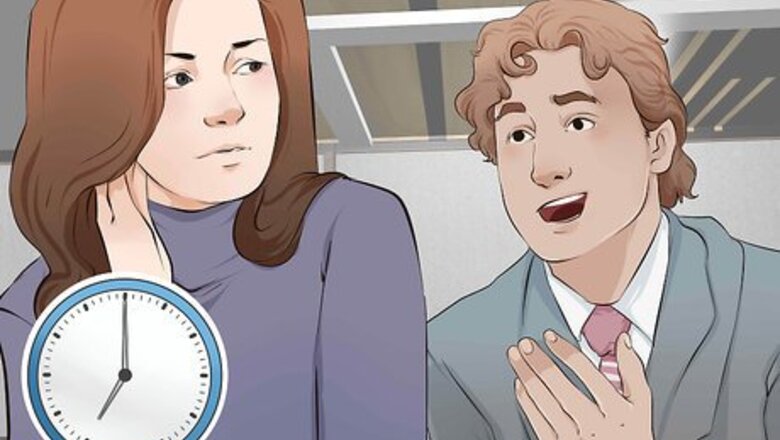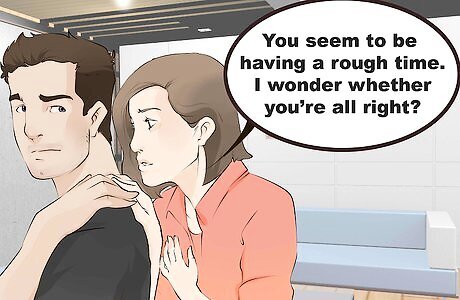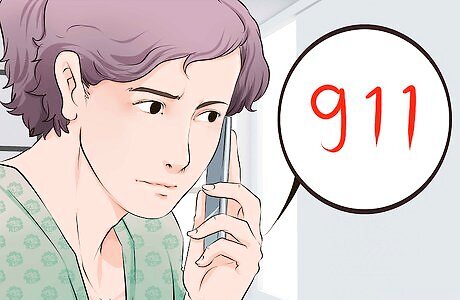
views
X
Trustworthy Source
Cleveland Clinic
Educational website from one of the world's leading hospitals
Go to source
Unfortunately, delusions are hard to treat because the beliefs are so fixed. If you have a loved one with this illness, educate yourself and express your concerns, but also be ready to intervene in case of a serious situation.
Expressing Your Concern

Pick a lucid moment to talk. One of the worst things you can do if you think a loved one is having delusions is to ignore it. You should reach out to your loved one while also considering how to contact his therapist (if he has one) or local mental health services for advice on treating delusional disorders. It’s OK to try to talk to your loved one about your concern, but pick a time when he is lucid. You may not be able to discuss your loved one’s mental state while he is actively having delusions.

Frame your concern as an opinion. Talk to your loved one and express your anxiety about her behavior and thought patterns. It is important to remain conscious or your tone and not become angry or aggressive. Try at all times to be gentle, honest, and non-confrontational. You will probably not be able to convince her that her delusions are mistaken, even with clear evidence. Be as non-judgmental as possible. Delusions are “fixed ideas.” Saying, “What you’re thinking isn’t real,” or, “No, you’re being paranoid and crazy!” won’t accomplish much and could actually strengthen the person’s delusions. Present your concern as an opinion instead, i.e. “You seem to be having a rough time. I wonder whether you’re all right?” or “I’m concerned for you. My own opinion is that you’ve developed some fixed ideas.”

Don’t play into the delusions. Avoid attempts to disprove your loved one but at the same time, do not play along with his delusions or make it seem like you agree. Try instead to connect to the person’s experience and understand him rather than refuting the delusion itself. Affirm that your loved one’s feelings are important while making it clear that you do not agree with him. Say something like, "I understand that you feel that way. I have a different opinion," or, “What you’re talking about is important; I just think you could be mistaken.” You might also subtly question your loved one’s delusions with suggestions, i.e. “Strongly believing something is true doesn’t necessarily mean that it is true, don't you think?” or “We’re all capable of misinterpreting things, aren’t we?” You could also try saying, “But our brains can misinterpret things and giving us the wrong idea, no?” or “Sometimes we can imagine things that seem very real — like dreams. That doesn’t mean they are real, though.”
Intervening in Serious Situations

Give your loved one space. People with delusional disorder may become agitated or have thoughts that can lead to harm, either to themselves or other people. As a precaution, give your loved one space if she’s having a serious delusional episode. Stand away or even place an obstacle like a chair between the two of you. Don’t touch your loved one without permission during a delusion. She may misunderstand or have a violent reaction. Keep your hands visible, as well. If your loved one is paranoid, be clear that you are there to help and not to hurt or harm her. Be mindful about your body language, which a loved one might misinterpret. Do not whisper, laugh, smile, or shake your head. In cases of paranoid delusions, these may serve to increase the person’s paranoia.

Ask questions about the nature of the delusions, if you can. Try to find out more about the delusion that your loved one is having — what he is experiencing. This can help you to determine whether he is a risk to himself or others and to determine what the best course of action is. Ask in a calm voice, again avoiding gestures that could be misinterpreted, “Are you having any thoughts about hurting yourself or someone else?” or, “Are you afraid of something or someone?” Again, don’t try to refute the delusions or tell your loved one that they’re not real. This is counter-productive. Instead, affirm the person’s experience, i.e. “I believe that you are telling things as you see them.” Don’t assume that your loved one will tell the truth about what he’s thinking or believing. If he is paranoid, he may not trust you.

Try to get your loved one to a hospital. Ideally, you’ll be able to get your loved one to a hospital where she can get the attention she needs in a crisis. This can happen voluntarily — that is, your loved one consents to be admitted to a hospital. It can also happen through involuntary committal, however, if she is not able to make the choice for herself. Reassure your loved one that the hospital is a safe place where she can get better. Tell her that it is not an institution, an asylum, or a prison and that it is not for punishment. You might also mention that most stays usually last less than two weeks. Let her know that hospitalization is confidential. No one outside of the family needs to know about it. Call the hospital on her behalf to learn more about admission, treatments, and policies. Offer her choices, as well, like what clothes to take and who will go with her.

Call for help, if need be. Unfortunately, people with delusional disorder can have dangerous ideas and might not consent to hospitalization. They may be paranoid and agitated; they may have thoughts of harming themselves or others; or they may be driven to do things that are illegal, like stalking. If you have a safety concern — for your loved one or others — call for help. Call 911 emergency services if you have reason to think that your loved one is an immediate danger to himself or could be a danger to others. You could also notify the police if your loved one has what is known as an erotomanic delusion, meaning he believes someone (usually someone important or famous) is in love with him, and is stalking or harassing someone. People with jealous delusions (believing his spouse or partner is unfaithful) or persecutory delusions (believing a person or entity is out to harm him) can sometimes become violent. Call for help if you think there is a physical danger involved. Consider involuntary hospitalization as a last option. Talk to a mental health professional if your loved one needs treatment but will not consent. Call a mental health doctor to find out what this will require — the police and lawyers may need to be involved.
Helping Your Loved One On a Day-to-Day Basis

Research delusional disorder on your own. If you have a loved one with delusional disorder, one of the biggest things that you can do to help her is to learn about the illness. Research delusional disorder. Find out what your loved one is feeling and experiencing and what her prognosis is. Start online by searching for “Delusional Disorder” online and at reputable mental health websites like the Cleveland Clinic or the National Alliance on Mental Illness. Try informational books, as well. Look at your local library or at bookstores for volumes on delusional disorder. Some titles include Delusional Disorder: Paranoia and Related Illnesses and Understanding Paranoia: A Guide for Professionals, Families, and Sufferers.

Talk to mental health professionals. Consider talking to experts about delusional disorder, as well. A doctor who specializes in mental health, a psychiatrist, or a psychologist may not be able to say anything specific about your loved one, but they might field your general questions or provide you with more literature or advice on what you can do to help. Did you know that there are different kinds of delusional disorder based on the type of delusion? Your loved one might have erotomaniac (i.e. false beliefs about someone loving him), grandiose (i.e. an inflated sense of worth), jealous (i.e. believing his partner is unfaithful), persecutory (i.e. paranoid), or somatic (i.e. belief that his body is abnormal or diseased) delusions. You can ask a professional about the symptoms you see to get a better idea of what kind of delusions your loved one is having. They may also be able to instruct you on how to get your loved one a proper diagnosis.

Research treatment options and centers. Don’t forget to learn as much as you can about how delusional disorder is treated. These days, treatment often involves medicine and/or psychotherapy. Try to find out about the different approaches but also about where your loved one might access these in your area. Be aware of different available psychological treatments, including individual psychotherapy, cognitive behavioral therapy, and family therapy. These can help your loved one and her family cope with the effects of the false thoughts. Your loved one might also need to take anti-psychotics or newer medications like serotonin blockers to treat the delusions themselves.

Help out with medical appointments. Another way that you can help on a day-to-day basis is by actively supporting your loved one’s treatment. Help your loved one get quality medical care, for example, by preparing for the first appointment or asking to go along to the doctor to later appointments. One thing you might do to help is to write up a list of questions for the medical team along with your loved one, e.g. “What sort of tests might I need to get?”, “What are the treatment options?”, and “What kinds of side effects do the medications have?” You can also encourage your loved one to get a second opinion, if need be.

Be willing to pitch in at home. Delusional disorder can be accompanied by other mental health issues, especially depression. This might be from the delusions themselves, which can lead to things like financial or legal problems. Or it might be due to a general sense of alienation from others. Be ready to help your loved one through these low periods. Many people with delusional disorder end up on antidepressants. Make sure that your loved one is taking these meds if he is seriously depressed. Try to help out with errands and household chores, if your loved one is going through a low period. Offer to pick up groceries, for example, or perhaps watch your loved one’s children. Encourage activity, as well. Try to get your loved one up and active even when depressed. For example, ask your loved one to go for a short walk around the block or, if that is too much, to sit outside in the sunshine with you.

Encourage your loved one to stick with treatment. Delusional disorder is hard to treat. For one thing, it's a chronic disorder that doesn’t always respond to meds and may require additional forms of treatment. Some people with delusional disorder don’t seek or continue treatment, too, because they don't recognize that they’re unwell. Help your loved one by monitoring and encouraging progress. You might help your loved one track the progress of treatment, for instance, by keeping a journal of diary with symptoms, setbacks, and milestones. Remind your loved one to take medication when necessary. If your loved one wants to stop taking antipsychotics, listen respectfully but suggest having an informed discussion with the doctor first. Ask your loved one to wait and to make a smart decision.




















Comments
0 comment